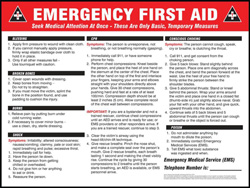



Find all of your laboratory and workplace safety supplies at Safety Emporium!
 Anosmia |
 Glossary Index |
 ANSI |
| MSDS Topics |
Free Sites | FAQ's | Regulations | Glossary | Software | Suppliers |
| Books | Forum | Poll | Fun stuff | Quiz | Store | |
| Understand your MSDS with the MS-Demystifier | Search ALL our MSDS info | |||||
Anoxia is the absence of oxygen in inspired (inhaled) gases or in arterial blood and/or in the tissues.
Anoxia is closely related to hypoxia, which is a severe oxygen deficiency in the tissues. One can think of anoxia as the most extreme case of hypoxia.

We have all kinds of first aid signs, posters and labels at Safety Emporium.
If your body isn't getting oxygen, you die. It's that simple. The same is true for fish that swim in water that is depleted in oxygen.
Anoxia usually appears on an SDS as a symptom of inhalation of a substance that interferes with oxygen transport mechanisms in the body, examples being carbon monoxide and hydrogen cyanide. When working with substances like these, special engineering controls such as a fume hood or local exhaust ventilation should be utilized. If these controls are not sufficient, then personal protective equipment such as a supplied air respirator should be utilized.
Anoxia can also be caused by entering an oxygen-depleted atmosphere. If your workplace has large storage tanks, sewers, etc, a confined space entry program is required under OSHA regulations.
See also: air, asphyxiant, carbon dioxide, hypoxia
Additional definitions from Google and OneLook.
Entry last updated: Wednesday, February 23, 2022. This page is copyright 2000-2025 by ILPI. Unauthorized duplication or posting on other web sites is expressly prohibited. Send suggestions, comments, and new entry desires (include the URL if applicable) to us by email.
Disclaimer: The information contained herein is believed to be true and accurate, however ILPI makes no guarantees concerning the veracity of any statement. Use of any information on this page is at the reader's own risk. ILPI strongly encourages the reader to consult the appropriate local, state and federal agencies concerning the matters discussed herein.